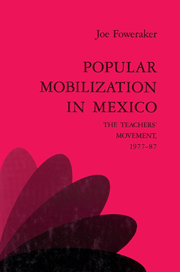Book contents
- Frontmatter
- Contents
- Preface
- Glossary of acronyms
- Introduction: The character and context of popular mobilization in contemporary Mexico
- PART I POPULAR MOVEMENT AND SYNDICAL STRUGGLE
- 1 Teachers as political actors
- 2 The original impetus
- 3 The institutional terrain
- PART II INSIDE THE MOVEMENT IN CHIAPAS
- PART III NATIONAL MOBILIZATION AND SYSTEM RESPONSES
- PART IV POPULAR MOVEMENTS AND POLITICAL CHANGE
- Bibliography
- Index
3 - The institutional terrain
Published online by Cambridge University Press: 29 September 2009
- Frontmatter
- Contents
- Preface
- Glossary of acronyms
- Introduction: The character and context of popular mobilization in contemporary Mexico
- PART I POPULAR MOVEMENT AND SYNDICAL STRUGGLE
- 1 Teachers as political actors
- 2 The original impetus
- 3 The institutional terrain
- PART II INSIDE THE MOVEMENT IN CHIAPAS
- PART III NATIONAL MOBILIZATION AND SYSTEM RESPONSES
- PART IV POPULAR MOVEMENTS AND POLITICAL CHANGE
- Bibliography
- Index
Summary
The teachers' movement emerged within the National Union of Workers in Education, or SNTE, which stood as the centerpiece of the legal and institutional terrain linking the teachers with the Mexican State. As one of the major syndical corporations of the ruling party, the SNTE contained the legal and institutional constraints and incentives that most closely conditioned the syndical and political practices of the movement. As the original site of the movement, the SNTE inevitably influenced its organization, as well as shaping its main strategic choices. If the teachers' movement represented a process of political organization within civil society, then the SNTE can be seen as a proxy for government control of this society; the official leadership of the union looked on its mass membership in much the same way as State officialdom looked on the “people.” The teachers' movement was therefore a popular movement that chose to struggle inside a major institution of the State.
The SNTE was created during the first years of intense construction of the modern Mexican State, and it soon became a mainstay of the institutional carapace of the political system. In 1938 the revolutionary government set up a syndical organization for its own employees, the Union Federation of Workers in the State Sector (the FSTSE), which was separate from the industrial and commercial sectors within the Confederation of Mexican Workers (the CTM) (Sirvent 1973, 1985). It took a little longer to cajole the four existing teachers' unions into the one organization of the SNTE, but this finally took place at the end of 1943.
- Type
- Chapter
- Information
- Popular Mobilization in MexicoThe Teachers' Movement 1977–87, pp. 45 - 58Publisher: Cambridge University PressPrint publication year: 1993



